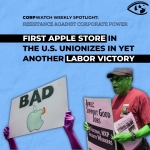AUSTRALIA: Libel Case Could Change Internet Future
Once it was heralded as the last bastion of freedom of speech, a realm which transcended national law and the whims of the courts. But last night the internet was facing up to a harsh new reality after Australia's supreme court ruled that a local businessman could sue a website for libel in Melbourne even though it was based in the United States.
In a case which opens up a legal minefield for web publishers across the English-speaking world, the high court judges decided that an internet article is published wherever it is read, rather than where the publisher is based. The landmark ruling is the first instance in the developed world of a libel trial being admitted in a foreign jurisdiction purely because of the possibility of an article being downloaded from the internet.
Media companies and internet campaigners immediately denounced the decision amid fears that it would open the floodgates for a wave of libel actions from around the world. They said the "chilling" ruling would seriously undermine the internet's much-cherished reputation for freedom of speech and raised the threat of "forum-shopping" by wealthy litigants looking for the easiest jurisdiction to ensure their victory in libel proceedings.
The case centres on a two-year-old article about Melbourne gold mining magnate Joe Gutnick, published in the American business magazine Barron's.
The article, entitled Unholy Gains, alleged that Mr Gutnick -- a multimillionaire rabbi nicknamed Diamond Joe who became a local hero in Melbourne after he saved the local Australian Rules football club with a A$3m (£1.1m) cash injection -- was involved in tax evasion and money laundering.
Most significantly, it claimed that he was the biggest customer of Nachum Goldberg, a Melbourne money launderer jailed in 2000 for washing A$42m (£15.5m) in used notes through a bogus Israeli charity. Mr Gutnick is suing the American business information company Dow Jones, which owns Barron's as well as the Wall St Journal. He has brought the case in Victoria, where libel laws give him a better chance of winning than in the US, where 98% of Barron's' readers live.
The magazine has 14 subscribers in Australia, of which five are in Victoria. But 1,700 of its internet subscribers had paid their bills using Australian credit cards, and the court ruled yesterday that this was enough to admit the case in Victoria.
"Publishers are not obliged to publish on the internet," the ruling stated. "If the potential reach is uncontrollable then the greater the need to exercise care in publication."
Barron's offices are in New York, and Dow Jones had argued that the place of internet publication was New Jersey, where the magazine's web servers are based. The company's defence even at one point floated the suggestion of declaring the internet a libel-free zone, based on a 1928 legal decision about the meaning of "publication".
In a clear indication of how serious the implications of the ruling may be, 18 of the world's biggest media organisations -- including AOL Time Warner, Amazon and Yahoo! -- made submissions to the court urging the judges to dimiss Mr Gutnick's action.
Mr Gutnick said after yesterday's verdict that the case had been a David and Goliath battle against "all the strongest media in the world".
"You have to be careful what you write, and if you offend somebody or write malicious statements about people, like what was done in my case, you can be subject to being prosecuted," he told the Nine Network. Dow Jones issued a statement expressing "disappointment" at the verdict. "The result means that Dow Jones will defend those proceedings in a jurisdiction which is far removed from the country in which the article was prepared and where the vast bulk of Barron's readership resides."
The court made it clear that they were not ruling whether Mr Gutnick had been libelled, merely that the case could now go ahead.
Crucially, however, the court made clear that a claim could only be brought in Australia if the person claiming libel had a reputation there that could be defamed. This will make it difficult for many foreign nationals to use the Australian courts to pursue internet libel actions.
But the ruling has thrown internet publishers into disarray and left them facing a choice between two equally costly and undesirable options: restricting access to their websites to prevent people in potentially difficult legal jurisdictions reading them; or employing international legal teams to vet all content to ensure that it complies with the libel laws in each of the countries it is likely to be read.
Andrew Kenyon, an expert on internet media law at the University of Melbourne, said the case could lead to media organisations having to use software to impose geographic restrictions on where their content could be viewed.
"This is going to make the biggest difference in the US, and I think we will see American media organisations now factoring in the possibility of defamation in other countries. It's important because it's the highest court in the country saying this, but I think a lot of media lawyers had been expecting something like this for some time."
Lance Taylor, founder of the UK web design association, said: "It's quite ludicrous. This decision will open up a minefield of potential litigation against web-based publishers. In the rush to regulate the internet with ill-conceived laws, countries like Australia will put a stranglehold on the future development of the internet and its associated technologies."
Ian Brown, director of the London-based internet thinktank, the Foundation for Information Policy Research, also voiced dismay. "This type of ruling will simply result in many US websites blocking access to non-American readers, destroying a rich resource for the rest of the world."
- 180 Media & Entertainment
- 192 Technology & Telecommunications


